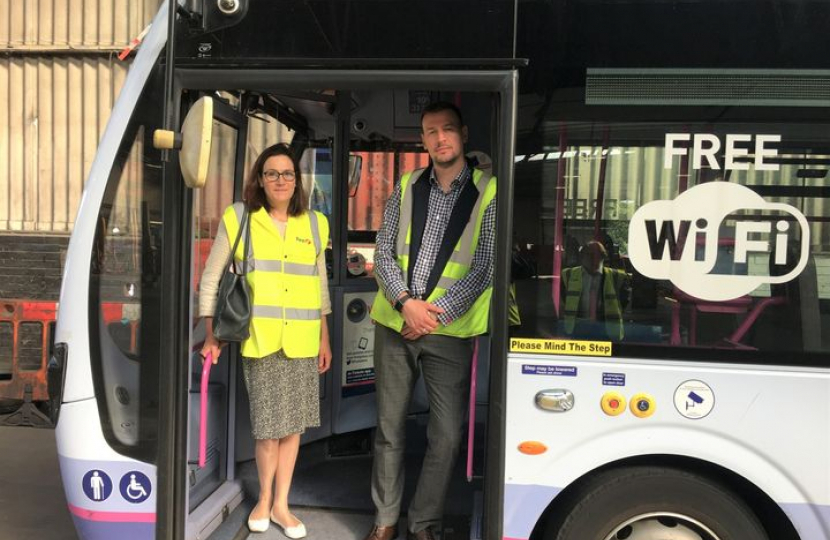
- Passengers across Essex will benefit from a new National Bus Strategy, which will deliver the most ambitious reform to the sector in generations.
- Essex County Council will need to work in partnership with operators on ambitious new Bus Service Improvement Plans for the benefit of passengers to be eligible for future funding.
- Plan paves the way for cheaper, quicker and more reliable bus services across England as the Conservative Government continues its levelling-up agenda.
Rebecca Harris MP has welcomed the Conservative Government’s announcement of a revolutionary new bus strategy, backed by £3 billion of investment, that will see passengers across Essex benefiting from more frequent, more reliable, easier to use and understand, better coordinated and cheaper bus services.
The strategy will require Essex County Council to work in partnership with bus operators to improve services for passengers in order to be eligible for funding in future.
Councils and operators will be expected to provide:
- Simpler single bus fares with daily price caps, so people can use the bus as many times a day as they need without facing mounting costs.
- More services in the evenings and at the weekends.
- Integrated services and ticketing across all transport modes in the area, so people can easily move from bus to train.
- Easy to access information, including online, so that services are simple to use.
- All buses to accept contactless payments.
Councils will also need to franchise services, as is the case in London, or establish statutory partnerships with operators – ensuring that they work in collaboration for the benefit of passengers. They will also be required to publish an improvement plan.
Such improvements will be underpinned by fundamental reforms to the sector, and will see operators need to work with their local councils on targets for improving passenger numbers, reliability and passenger satisfaction, to be eligible for future government funding.
Only councils and operators who work to meet these requirements will continue to receive the around £100 million per month emergency Covid funding for the sector, or any new sources of funding from the £3 billion investment.
Levelling up services across the country will help ensure more people turn to the bus, rather than the car, as the country builds back better and greener from the pandemic.
Commenting, Rebecca Harris MP said:
“Good bus services can have a transformational role in places like Essex, unlocking job opportunities, boosting businesses and supporting economic growth.
“This new National Strategy Bus Strategy, backed by £3 billion, will help make to make this a reality – paving the way for simpler fares, more reliable services, and better connections across every part of the country.
“At the last general election, I stood on a manifesto that promised to level up and improve transport connections across Essex, and this boost to our local bus services will help to deliver on that promise.”
Prime Minister Boris Johnson said:
“Buses are lifelines and liberators, connecting people to jobs they couldn't otherwise take, driving pensioners and young people to see their friends, sustaining town centres and protecting the environment.
“As we build back from the pandemic, better buses will be one of our first acts of levelling-up.
“Just as they did in London, our reforms will make buses the transport of choice, reducing the number of car journeys and improving quality of life for millions."
Transport Secretary Grant Shapps said:
“Buses are this country’s favourite way of getting around. They help us get to school, to the GP, or to the shops – but services across England are patchy, and it’s frankly not good enough.
“The quality of bus service you receive shouldn’t be dependent on where you live. Everyone deserves to have access to cheap, reliable and quick bus journeys.
“The strategy I’m proud to unveil today will completely overhaul services, ensuring we build back better from the pandemic. Key to it is the new deal it offers to councils – we will provide unprecedented funding, but we need councils to work in partnership with operators, and the Government, to develop the services of the future.
